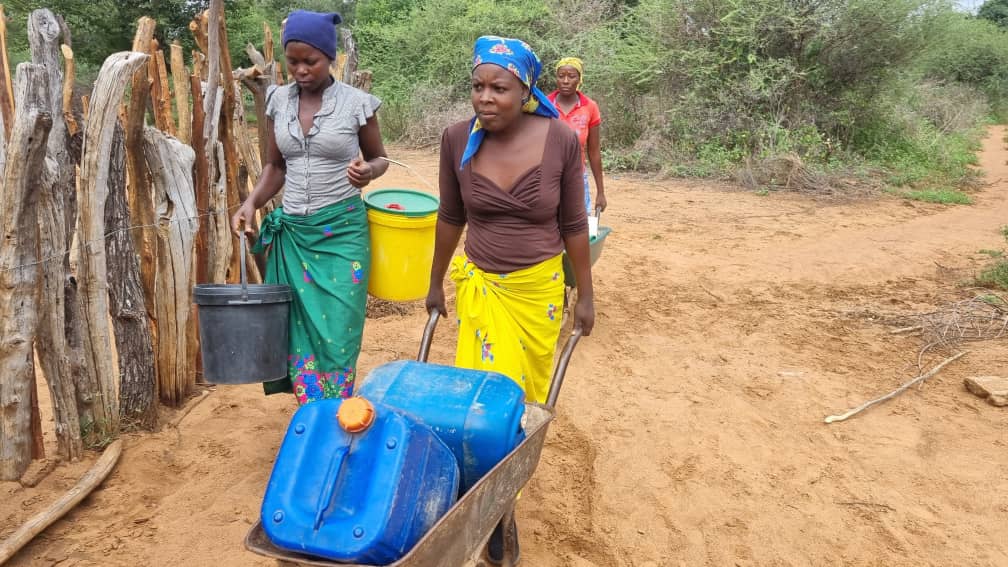
BY MOSES MUGUGUNYEKI IN MALIPATI, CHIREDZI
IT’S 9am and Edna Chauke is one of a handful of people at Malipati Shopping Centre in Chiredzi Rural on the periphery of Gonarezhou National Park in Masvingo province.
A day before, Chauke had come to the shopping centre to receive a parcel that had been sent by bus from Chiredzi.
The bus, the only one that plies the route between Chiredzi and Corner 18 – a village on the fringes of the Masvingo-Matabeleland South provinces border, had not reached Malipati, compelling Chauke, a mother of two, to go back home, some 10km away.
Chauke was optimistic that the bus would come and she would get her parcel.
“I am sure the bus is on its way from Chiredzi because yesterday it did not reach this place in the evening because the roads had become impassable after it rained,” Chauke said.
“I am expecting a parcel from a relative in Chiredzi and this is the only bus and our only hope.”
According to her, the bus had failed to make it through the muddy road linking Chikombedzi and Chiredzi town.
- Chamisa under fire over US$120K donation
- Mavhunga puts DeMbare into Chibuku quarterfinals
- Pension funds bet on Cabora Bassa oilfields
- Councils defy govt fire tender directive
Keep Reading
“We have one bus that goes to Chiredzi town in the morning and another one that comes from town later in the day,” Chauke said.
“If you miss any of those busses from either side your journey would have been clogged.”
For Chauke and many villagers in Chiredzi rural, life is not a bed of roses. They face a plethora of challenges despite the area having been one of the constituencies in the country that voted overwhelmingly for the ruling Zanu PF in the past general elections.
The votes have not translated into progress and the constituency remains among the least developed in the country.
“Transport is one of the biggest challenges that we face here in Chiredzi rural,” said Tafadzwa Sithole from Gwaivhi village in Ward 14.
“I came to Malipati hoping to take my brother home after schools had closed, but I could not go back because the bus did not come from town after a heavy downpour last night.
“People pay an arm and a leg to get to Chiredzi, around R150 (US$10) for a distance of 160km.”
Sithole said it would have been risky if he had travelled on foot because of wild animals that stray from the nearby Gonarezhou National Park.
“I could have travelled back home on foot, but I could not risk my life because of wild animals,” he said.
Villagers said sick people and expecting mothers bear the brunt of the transport crisis the most in the area.
“We have many incidents where women have died after they would have failed to go to the hospital in Chikombedzi, some 50km away,” said Vainah Zukwi.
“Our clinics at Malipati and Dumisa would have referred an expecting mother to hospital in Chikombedzi, but they die after they fail to get transport.
“The situation is aggravated when it rains. “The roads become impassable and Mwenezi River becomes flooded.”
According to UNFPA, maternal mortality in Zimbabwe stands at 614 deaths per 100 000 live births, one of the highest maternal mortality rates worldwide.
Marginalised communities, including Chiredzi rural are the hardest hit.
Zukwi said people have risked crossing the flooded Mwenezi River or walking across the wildlife-infested game park to go to hospital.
“Here we live by the grace of God because we are in a catch 22 situation,” she said.
“It’s like you walk across the bridge in the game park or you risk the crocodiles in the river.
“Our clinics are limited and they don’t have adequate drugs and equipment, so patients are referred to Chikombedzi.”
Villagers from Chiredzi South said when it rains they are cut off and cannot access services either from Beitbridge or Chiredzi.
Chiredzi South is in the middle of Limpopo, Runde, Sengwe and Bubi rivers.
Another bridge across Runde River, which used to link Gonarezhou National Park with Chipinda communal lands was swept away by Cyclone Eline in 2000 and is yet to be repaired.
Chiredzi South MP Kalisto Gwanetsa could not be reached for comment yesterday, but last year he acknowledged that when it rained people were forced to use alternative routes which are 500km further in order to access medical services in Chiredzi town.
Marumbini village head, David Simbi said his area was among the most neglected with little progress.
“Development has been stagnant in this area and no one is coming in to support us,” he said.
“We were displaced from our village of origin – Marumbini – to pave way for the expansion of the game park and came here.
“However, they have done nothing to develop the area.
“Even the parks guys don’t bother to develop this area, as they believe that wild animals are more important than us.”
However, Zimbabwe Parks and Wildlife Management Authority (ZimParks) spokesperson Tinashe Farawo said ZimParks was not mandated to develop communities.
“Development of communities is the mandate of government not ZimParks,” Farawo said.
“We, however, work with communities on a number of projects and in the case of Gonarezhou we are working on how best we can address the issue of wildlife-human conflict.
“ZimParks is also pushing for community tourism to embrace communities in tourism activities.”
He said ZimParks was also trying to come up with policies that would help communities living close to national parks.
This publication established that health centres particularly Gezani Clinic, Phahlela Clinic, Malipati Clinic and Dumisa Clinic due to their large catchment areas were failing to cope, compelling patients to be referred to Chikombedzi District Hospital or Chiredzi town to buy medication.
“Sometimes you come to the clinic and they tell you that there is no medication and they refer you to Chikombedzi Hospital,” said Munyaradzi Tengwea.
“There are harrowing tales of people having been attacked by crocodiles while trying to fetch water from the river because boreholes would have been broken.”
Ananias Ndlovu from Matshala village in Ward 15 said his community was facing acute shortages.
“We don’t have boreholes in the area and people travel long distances to fetch water in other villages,” he said.
“When it rains it becomes worse.”
Villagers said most schools in the area face teacher shortages.
“There are few teachers in schools. We would rather send schools to distant schools like Malipati High School,” said Sithole.
He said Chishinya Secondary School was one of the least developed schools.
“The school does not have enough blocks and teachers stay at the primary school,” Sithole said.
“The pass rate is not that convincing and very low.”










